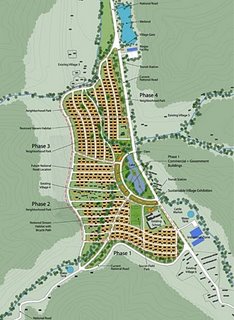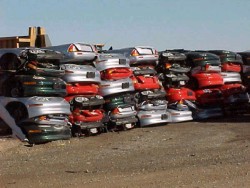 The BBC has an interesting progress report on the Huangbaiyu eco-village project in rural China. Huangbaiyu gained some press partly due to the involvement of some big environmental names. The chair of the project is William McDonough, an architect probably best known for putting the largest green roof in the world on top of a Ford factory.
The BBC has an interesting progress report on the Huangbaiyu eco-village project in rural China. Huangbaiyu gained some press partly due to the involvement of some big environmental names. The chair of the project is William McDonough, an architect probably best known for putting the largest green roof in the world on top of a Ford factory.The financer of the project claimed that he had to make some minor adjustments for financial reasons. This would explain the lack of both solar panels and the special insulation coating specified in the original plans. More curious though is that he found money to add garages to each house (not in the plans) and decided not to face the houses south (bad passive-solar feng shui). In addition to this, some of the locals think that they are very ugly and have concerns about how the lack of a garden could leave them without a reliable income. The situation is summed up by this quote in the article:
"What the small Huangbaiyu experiment shows is the danger of trying to impose a new way of life on people without fully understanding their needs and the realities of their lives."
...but back to McDonough for a second... He's on the editorial board of the Jounal of IE. His writings are very creative and his work with architecture/city planning and product/process design seeks to bridge the gap between IE dreams and reality. Another of his Chinese projects is shown below. With China's rapidly urbanizing population and large amount of land unsuited for agriculture, he proposes holistic designs incorporating ideas such as moving farms onto urban rooftops.
Project links:
China-US Center for Sustainable Development - overview of Huangbaiyu Village
Slideshow of Construction
Project Description from McDonough + Partners






